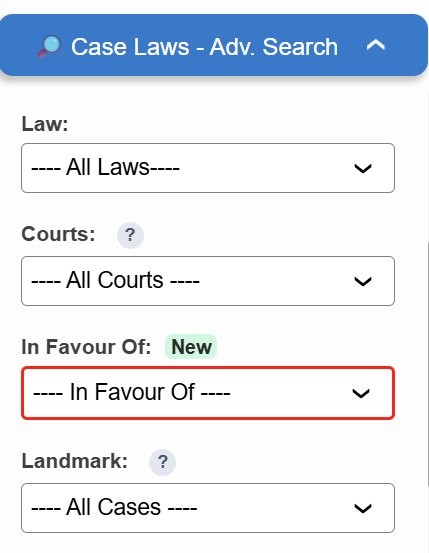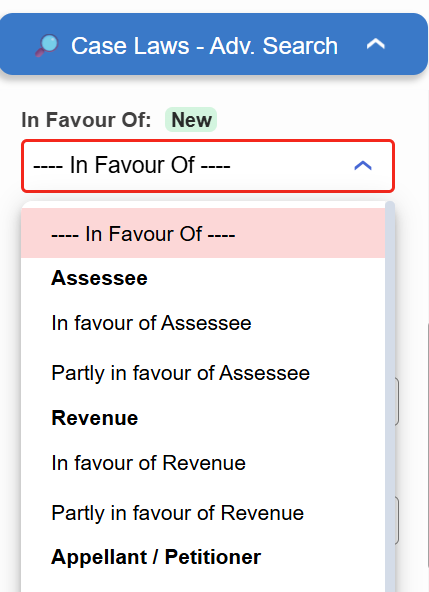Introducing the “In Favour Of” filter in Case Laws.
- ⚖️ Instantly identify judgments decided in favour of the Assessee, Revenue, or Appellant
- 🔍 Narrow down results with higher precision
Try it now in Case Laws →


Just a moment...
Introducing the “In Favour Of” filter in Case Laws.
Try it now in Case Laws →


Press 'Enter' to add multiple search terms. Rules for Better Search
No Folders have been created
Are you sure you want to delete "My most important" ?
NOTE:
Don't have an account? Register Here
<h1>Tribunal rules against tax authority in unauthorized revisional order case.</h1> The Tribunal ruled in favor of the assessee, holding that the Principal Commissioner of Income Tax's revisional order under Section 263 was unsustainable. ... Revision u/s 263 - Addition u/s 68 - Assessee has owned up and surrendered the amount of investment in firm as its investment and contribution - HELD THAT- In the absence of any credit in the books of assessee partner, the provisions of Section 68 has no application on which the al legation is based. In such factual matrix, we find merit in defense of the assessee that chargeability of tax with reference to Section 115BBE is not permissible in the present case towards purported undisclosed income declared by the assessee in the course of survey. As pointed out, the assessee being partner of the firm, claims to have invested the impugned amount in the partnership firm and surrendered as its undisclosed income. CIT in the revisional proceedings could not have invoked Sect ion 68 towards such unexplained investments in the firm in the absence of any credit in the books of assessee per se and the right course, possibly, could be Section 69 of the Act at best for which no case has been made out by the Pr.CIT. As contended Tribunal cannot uphold the revisional action of the Pr.CIT on a different ground then what is alleged in the revisional proceedings as held in CIT vs. Jagadhri Electric Supply and Industrial Company, [1981 (3) TMI 19 - PUNJAB AND HARYANA HIGH COURT] - We thus find traction in the contention that where Section 68 as alleged and invoked by the Pr.CIT is not applicable, Section 115BBE could not be triggered by modifying the premise of revisional direct ions. The revisional act ion of the Pr.CIT thus fails on this count also. Appeal of the assessee is allowed. Issues:1. Jurisdiction of Principal Commissioner of Income Tax under Section 263 of the Income Tax Act, 1961.2. Scope of limited scrutiny assessment and revisional powers of the Principal Commissioner.3. Application of Section 115BBE and Section 68 of the Income Tax Act.Analysis:Issue 1: Jurisdiction of Principal Commissioner under Section 263The appeal was filed against the order of the Principal Commissioner of Income Tax (PCIT) under Section 263 of the Income Tax Act, 1961, seeking to set aside the assessment order passed by the Assessing Officer (AO) concerning the assessment year 2017-18. The PCIT directed the AO to redo the assessment considering the income surrendered by the assessee as undisclosed income chargeable under Section 115BBE. The PCIT found the AO's assessment erroneous and prejudicial to the revenue's interest. The Tribunal held that the PCIT's revisional order was unsustainable as the AO had correctly worked out the tax liability within the limited scrutiny scope, and the PCIT could not go beyond the specified issues for scrutiny.Issue 2: Scope of Limited Scrutiny Assessment and Revisional PowersThe assessee contended that the assessment was limited to the issue of 'payment of tax in cash during demonetization period' as per the CBDT Instruction. The AO complied with this issue, examined the relevant documents, and framed the assessment on the returned income. The Tribunal noted that the AO's actions were in line with the limited scrutiny scope, and the PCIT could not revise the assessment based on issues not specified in the scrutiny notice. Citing precedents, the Tribunal emphasized that the revisional authority cannot expand the scrutiny beyond the identified issues.Issue 3: Application of Sections 115BBE and 68The PCIT alleged that the assessee's undisclosed income should be taxed under Section 115BBE, invoking Section 68. However, the Tribunal found that Section 68 was not applicable as the assessee had declared the investment in a firm as its own, with no credit in the books. The Tribunal held that the PCIT's invocation of Section 68 was incorrect, and Section 115BBE could not be applied. The Tribunal emphasized that the PCIT's revisional action failed as it was based on incorrect grounds not supported by the facts presented. The Tribunal allowed the appeal, concluding that the PCIT's revisional order was not sustainable under the law.In conclusion, the Tribunal ruled in favor of the assessee, highlighting the importance of adhering to the specified issues in limited scrutiny assessments and restricting revisional powers to the scope defined by law. The Tribunal emphasized that the PCIT's jurisdiction under Section 263 must be exercised within the legal boundaries and based on factual merits to prevent erroneous and prejudicial assessments.